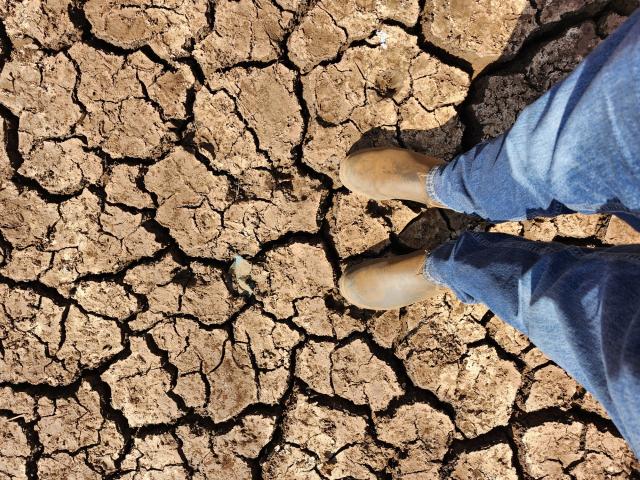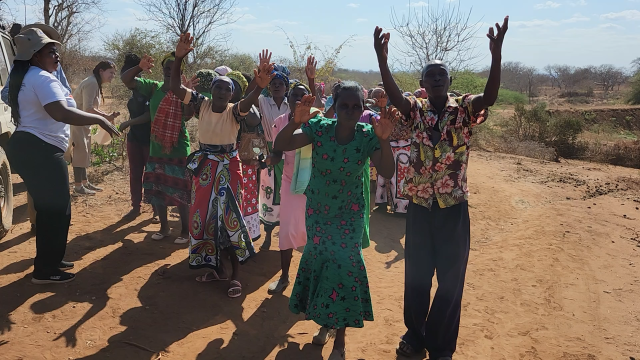In a visit to Global Partners in Kenya, Sherri Fowler witnessed resilience and joy in the face of water scarcity

All life is governed by water—it is the living water. Without it, we perish.
As a member of the United Church of Canada delegation to Kenya this year, I experienced with all my senses the vital presence—and painful absence—of water in people’s daily lives. I witnessed the effects of drought, food insecurity, polluted rivers, and soils so parched and cracked they seemed to cry out. I watched women carry heavy containers of water across great distances under the relentless equatorial sun (side note: I even had the chance to cross from north of the equator to the south—in one short hop!).
Through meetings with our Global Partners and the local guides who led us to projects in action, I was immersed directly into people’s lives—their vulnerabilities, their challenges, and their accomplishments. In the rural communities, we were often greeted at the entrance to farms by women singing, dancing, and waving their arms in joyous celebration of our arrival.

These incredibly resilient people, who live amid water scarcity, embraced life with hope and deep faith, knowing that God was at work with them, always by their side. Even when they dug for water only to find salty sources that damaged their crops. Even when one mother lost her 13-year-old son to a crocodile as he was fetching water for his family. And even as they collectively cooked us a meal fit for royalty, their spirits remained unwavering.
Can we, in the Western world, learn from that kind of faith?
The United Church of Canada, through its global partnerships in Kenya, has provided support for rural farming initiatives to adapt to the changing climate—with new methods, mentorship, tools, and infrastructure.
Have you ever heard of an earth dam? I hadn’t—not until I flew halfway around the world and found myself standing in a landscape unlike any I had known before, in Kitui, where the Nature+ program is presented by the National Council of Churches of Kenya (NCCK) in partnership with the Canadian Foodgrains Bank. Through education and partnership, local communities have learned to build earth dams made of soil and rocks, enabling them to capture and store rainwater during the wet season.
In Kenya, it is only women and children who must fetch water—a task that can take hours each day, on top of fieldwork and household responsibilities. The earth dams have eased that burden, reducing both the time and physical strain of collecting water.
We were escorted by a lively group of women, singing and linking arms with us, as they led us down to an earth dam. Oh my! Around the edges, the soil was cracked and dry; the water itself was a cloudy tan colour. Nearby, the large water vessels waited to be filled. We crouched down and poured a few litres into one container, knowing that when we left, the real work would begin again.

Earth dams are only one part of the remarkable response to water scarcity; The United Church of Canada also partnered in supplying water storage tanks. The one that I saw included the United Church’s name and crest, and a quote from scripture: “For I was hungry and you gave me food, I was thirsty and you gave me drink, I was a stranger and you welcomed me.” (Matthew 25:35)
Through the same spirit of learning and partnership, communities are now terracing their land and digging trenches by hand, not only to capture rainwater but also to prevent soil erosion when the rains come.
It was hard to imagine, as we walked across dusty red earth under the fierce sun, that within weeks this landscape would transform—almost violently—when the rains arrived. Roads would close, supplies would be cut off, and yet preparations were being made with faith and foresight.
That day, I watched dedicated, ambitious workers—men and women, young and old—digging, laughing, and moving with a rhythm that seemed almost divine. God was there. The rain would surely come.
And I ask you again: can we, in the Western world, learn from this?
A Final Reflection
Water is more than a necessity—it is a sacred connection, a reminder of our shared vulnerability and divine dependence. Kenya taught me that living water is not only what flows through rivers but what flows through faith, hope, and community.
I came home both humbled and inspired—and, truthfully, a little thirsty.
Are you?
—Sherri Fowler, Child of God, Similkameen Valley, British Columbia
The views contained within these blogs are personal and do not necessarily reflect those of The United Church of Canada.